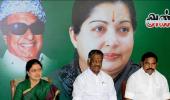For Prime Minister Narendra Modi to dig up the perceived past of the DMK rival, now under a new leader in M K Stalin, may not gel with the voters, both old and new. If they are still going to vote for the AIADMK-BJP combine, it will be for entirely different reasons, and despite Modi’s poll speeches, says N Sathiya Moorthy.

Launching the Bharatiya Janata Party’s campaign only days before the Election Commission announced April 6 as the polling date in Tamil Nadu, Prime Minister Narendra Modi targeted the Dravida Munnetra Kazhagam rival of the All India Anna DMK-led combine, focussing on the law-and-order front. Under DMK’s rule, rowdies would rule the streets, and women cannot feel safe, said the prime minister in a rally at Coimbatore, which is considered the state’s business and industrial capital.
This was the line that the then Grand Alliance opposition of the Congress-O under K Kamaraj and the Swatantra Party of Rajaji took in the by-now-forgotten 1971 elections. After the death of party founder C N Annadurai two years after taking over, M Karunanidhi was chief minister at the time. The DMK had aligned with the ruling Congress-R of Prime Minister Indira Gandhi and they swept the polls.
Subsequently, the breakaway AIADMK under MGR used the ‘L and O’ syntax to capture power in the post-Emergency assembly polls of 1997, which came six months after the historic Lok Sabha polls that very year, and which saw the ruling Congress and Prime Minister Indira Gandhi losing power at the Centre. Though some still see law and order and Karunanidhi as the sole cause for MGR’s winning streak, specific, pro-people policies alone helped MGR retain power until his death in December 1987.
Subsequently, the ‘Rajiv Gandhi assassination’, coming in the aftermath of the short-lived Chandra Shekhar government at the Centre, dismissing the post-MGR DMK state government months earlier, helped the re-unified AIADMK under Jayalalithaa sweep the polls as never before, in the company of the Congress, in 1991. Not since then has the law and order card cost the DMK any election, over the past 20 years. If anything, a whole new generation of voters have grown without complaints against the DMK on this score.
With the party not in power since 2011, anti-incumbency, if at all, is on the other foot. First-time voters in 2021 have only the BJP and the post-Jaya AIADMK as ruling parties at the Centre and in the state, to evaluate their performance while in office. Law and order may be included in their reckoning, now that PM Modi has flagged it as a poll issue – but not against the DMK.
Indications are that the inputs for Modi’s poll speeches in ‘Dravidian’ Tamil Nadu still seem to be sourced from traditional ‘Hindutva’ forces from a period long before he became a household name in the state. The latter happened, not with elections 2014, which he swept elsewhere in the country, but with demonetisation two years later.
In the 2019 LS poll campaign, again in the company of post-Jaya AIADMK, Modi focussed his speech almost entirely on ‘surgical strikes’, where as his audience was looking for promises on post-election relief on the GST front. The same applies to Modi’s constant reference to the Thirukkural and other Tamil couplets from the ancient past. If it’s genuine, then people appreciate it. If it is a poll prank, then even Indira Gandhi, who began it all decades earlier, did not reap any benefit in her time -- which is now a distant memory for the grey generation.
The result? BJP nominee in Coimbatore constituency, C P Radhakrishnan, victorious veteran from the post-blasts poll of 1998, lost by three lakh votes. Back-of-the-envelope calculations showed that Radhakrishnan should have won by a five-lakh vote margin. With Modi as PM nominee, and his kind of speeches not connecting to the constituency, the BJP-NDA, including the ruling AIADMK, lost the polls very badly in Tamil Nadu. They could retain only one of 39 seats, with the rival DMK-Congress combine bagging the rest, all but one with massive margins.
Across the nation, and more so in Tamil Nadu, barring price rise and unemployment, no political issue has won or lost elections, more than once. In 2011, the 2G scam ensured that the Congress-DMK combine lost across the country, and also in the state. In 2019, Modi was the issue, and he swept the poll, like incumbent PM, Manmohan Singh had won -- no comparisons there -- in 2009.
And for Modi to dig up the perceived past of the DMK rival, now under a new leader in M K Stalin, may not gel with the voters, both old and new. If they are still going to vote for the AIADMK-BJP combine, it will be for entirely different reasons, and despite Modi’s poll speeches.
There is a parallel. In 1996, five years after the DMK parent had suffered its worst-ever electoral rout, Jayalalithaa as rival AIADMK chief minister, assumed that the people hated Karunanidhi as much as perceived, as they used to do under her late mentor, MGR. Hence, she and her political aides with live-in confidante Sasikala Natarajan as head, had a free run of the state, both in terms of corruption and law and order violations.
Jayalalithaa and her advisors, who included Sasikala’s shrewd and calculative husband, the late M Natarajan, or ‘MN’, forgot that the new generation of voters did not know what the ‘Karunanidhi era atrocities’ were but were seeing and feeling the effects of lawlessness under their care, personally. The AIADMK, this time, suffered its worst ever electoral battle, and Jayalalithaa became only the third chief minister to lose her seat, that too by a very respectable 8,000-vote margin.
In a way, the same could be said of Modi’s lieutenant-in-chief, Amit Shah. He has since targeted ‘family rule’ in the DMK. Long before he launched his campaign on Sunday, the anti-BJP social media in the state has been carrying memes on his son Jayant Shah’s role in the BCCI, and the latter’s income allegedly spiralling over the past couple of years.
What is true of the BJP duo may be true of their AIADMK allies as well, though in a different way. Unlike as hoped for by detractors, incumbent Edappadi K Palaniswami (EPS) has carried the party with him, at least as far as his nomination as the party’s chief ministerial face goes. But that has not stopped the obviously sulking camp of deputy chief minister and AIADMK coordinator O Panneerselvam (OPS) from putting out periodic two-page newspaper ads on their leader’s achievements and contributions, in the local Tamil media, choosing two newspapers at a time, in cycle.
Incidentally, of OPS’s two sons, one is already the lone NDA member of the Lok Sabha from native Tamil Nadu, and he is promoting the second son, too, politically. Other AIADMK leaders, including EPS’s conscience-keeper and spokesman, Fisheries Minister D Jayakumar, and even some BJP leaders in the state, have been promoting their children in politics. Some of them are not unlikely to get a party ticket in the assembly polls. Their numbers may be relatively higher, at times much higher in the DMK, and also the Congress ally.
As for as EPS is concerned, his constantly converting DMK boss M K Stalin’s poll promises into governmental decisions through an official order that very day, has left the latter without a cause ahead of the polls. However, by joining issue with Stalin and denying that he was only acting on Stalin’s polls promises, EPS has also given the latter news space, at a time the local media has been inexplicably keeping much of the DMK news out of their pages or air-space as the case may be.
Stalin, over the past several years, and more so in recent weeks, has been complaining publicly about this tendency -- but even those statements have not found their way into the newspaper pages.
To the extent EPS has been making such announcements, and acting on some, through the past several weeks, some of them in the concluding session of the outgoing assembly, as a whole they have come to be seen not as policy initiatives or poll promises -- but as kind of a mockery of the system. It may not owe to him alone. Jaya as chief minister used to make what is known as ‘110 statement’ under the relevant assembly rules, day in and day out -- especially during the budget sessions -- when she was chief minister in her last, long innings.
On the day the house was debating the budget proposals for a given ministry/department, she would rob the minister concerned of his moment in the limelight through those announcements. But many, if not most of those promises remained as such. The shadow of her promises now continues to haunt EPS, too, as he has also been following Amma’s modus in the matter.
Yet, there is no denying that EPS has robbed Stalin of his own flood-lit moment, especially after the latter launched his constituency-wise outreach programme close to a month back. Stalin became wary of making area-wise commitment on development works if the party came to power. After a time, the DMK seemed to have reserved all those promises for the election manifesto, and take it to the voter from there.
But the timing is crucial. If the DMK announces its manifesto too early, the AIADMK may improve upon it. If it became too late, the DMK may not have the time to take it to the voter. As the ruling party, the AIADMK may still be able to do so with its ‘improved / improvised’ manifesto, instead.
Though in 2006, Jayalalithaa ridiculing the DMK’s promise of Re 1 rice scheme first and following it up with free rice did not bring her votes -- but only ridicule. She lost power, also owing to other reasons -- and the DMK returned to power after a five-year hiatus.
N Sathiya Moorthy, veteran journalist, political analyst and author, is Distinguished Fellow and Head, Chennai Initiative, Observer Research Foundation.











 © 2025
© 2025